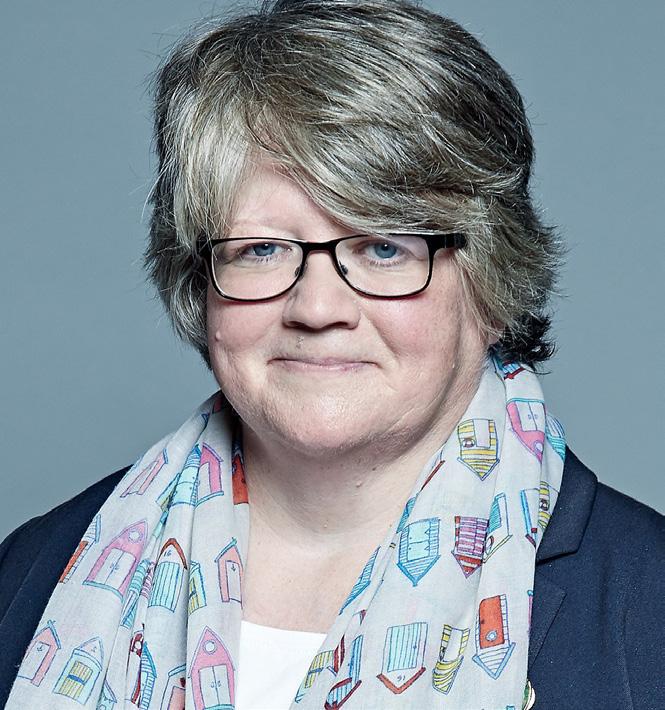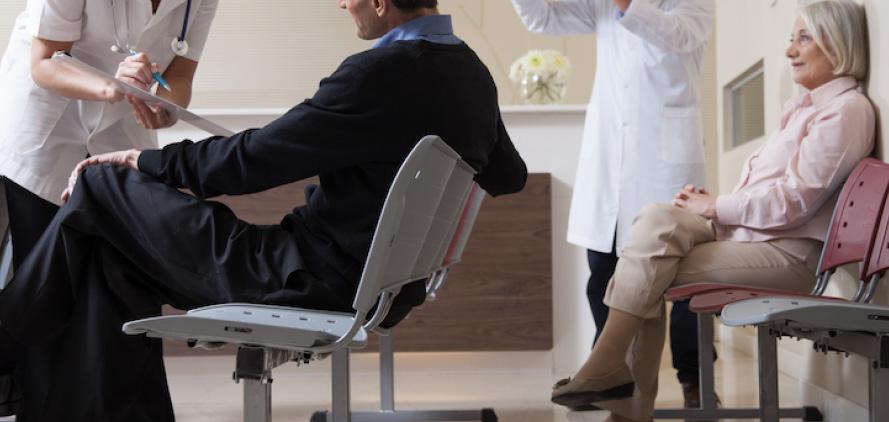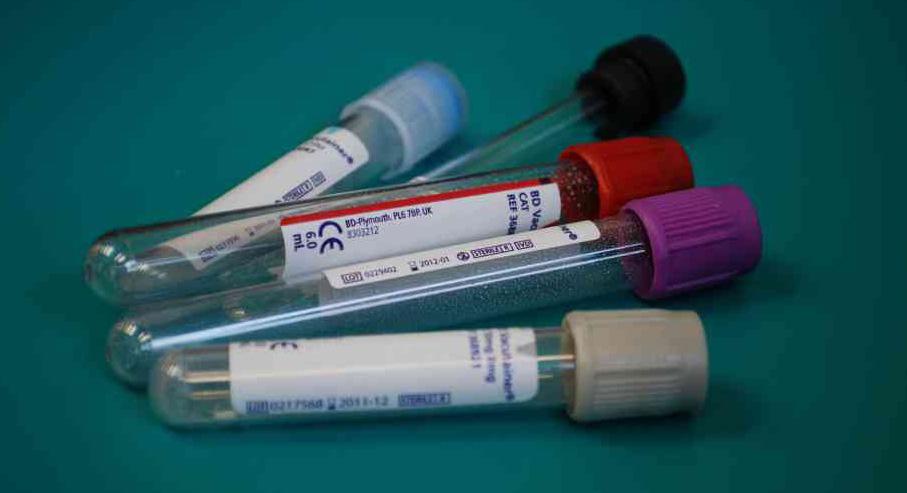
28 minute read
News
from Health Business 22.5
by PSI Media
Thérèse Coffey appointed health secretary
Thérèse Coffey has been appointed health secretary by new prime minister Liz Truss.
She replaces Stephen Barclay, who had been in the role for two months.
The MP for Suffolk Coastal since 2010 has previously served as work and pensions secretary, environment minister, Commons deputy leader and assistant whip.
Her appointment as health secretary has been criticised by abortion charities, due to her record on abortion rights.
When asked about her views on abortion following the US Supreme Court ruling, she said the law was not going to change in the UK, though she would prefer people not to have abortions.
She has previously voted against extending access to abortion care and recently voted against making at-home abortion pills permanently available in England and Wales. In 2010, as a backbencher, she introduced a motion in Parliament, which called for mental health assessments for women seeking an abortion. She also voted against extending abortion rights to women in Northern Ireland.
Upon her appointment, Coffey said: “I am honoured to be asked to serve as SoS for Health and Social Care. Patients are my top priority, as we focus on ABCD - ambulances, backlogs, care, doctors and dentists.”
READ MORE
QUEEN’S FUNERAL
NHS workers take part in Queen’s funeral
NHS workers took part in the Queen’s funeral last month.
May Parsons, a modern matron at University Hospital in Coventry, who delivered the first Covid vaccination, joined members of the Civilian Services Contingent, with some marching with the Queen’s coffin and others in the congregation.
Ms Parsons accepted the George Cross from the Queen in July on behalf of the health service.
Volunteers from St John Ambulance also took part in the funeral procession.
Dr Henrietta Hughes, the first ever patient safety commissioner for England, began the role in September.
In her new position, Dr Hughes will be an independent point of contact for patients. The intention of the role is to use patients’ insight to help the government and healthcare system in England listen to and act on patient’s views. This will be used to promote patient safety particularly in regard to medicines and medical devices.
The patient safety commissioner can be contacted at commissioner@ patientsafetycommissioner.org.uk.

READ MORE
PATIENT SAFETY
Patient safety commissioner starts new role
READ MORE WINTER PRESSURES
More GP staff to be recruited ahead of winter

More than a thousand GP assistants are set to be recruited to practices in an attempt to free up doctors’ time to see more patients.
The GP assistants will offer more admin support, do blood pressure checks, heart rate and blood tests and arrange appointments, referrals and follow-up care for patients.
Up to 1,250 digital and transformation leads will also be recruited to improve patient access to primary care.
Each primary care network will have a digital lead, who will ensure practices are using the latest technology, offer more telephone lines and offer support with the NHS app.
Dr Amanda Doyle, national director of primary and community care, said: “Giving patients timely and convenient access to GPs and primary care is vital, especially during winter, which is why we are introducing brand new roles and giving GPs more flexibility to create teams that best meet the needs of their local population.
“NHS staff have worked incredibly hard to deliver record numbers of GP appointments for patients, with 11 million more this year so far than the same period last year, and more than four in five people who book an appointment seen within two weeks, including two fifths who are seen on the same day.
“The introduction of GP assistants can reduce the time doctors spend on correspondence by up to 85 per cent, while also carrying out basic clinical tasks such as taking patients’ blood pressure and heart rate, meaning doctors have more time to do what they care about most – treating patients – while digital leads will help practices use the latest technology to manage demand and capacity”.
READ MORE


NHS Scotland announces winter plans
Scottish health Secretary Humza Yousaf has set out measures for the NHS over the coming months to support the health and care system over the winter.
The measures include the recruitment of 1,000 additional staff over the winter, with £8 million of funding to recruit up to 750 nurses, midwives and allied health professionals from overseas and 250 support staff across acute, primary care and mental health; £45 million for the Scottish Ambulance Service to support on-going recruitment, service development and winter planning; and £124 million to assist health and social care partnerships expand care at-home capacity.
The Social Care Staff Support Fund will also be extended to 31 March 2023, so staff receive full pay in Covid isolation.
GPs will be contacted to underline the expectation that pre-bookable appointments are available in every practice, as well as sameday, face-to-face and remote appointments.
Yousaf said: “NHS Scotland’s staffing and funding is already at historically high levels, but as we approach the winter period it is crucial that we look to maximise, and enhance where we can, the capacity of the NHS. Given the scale of the escalating cost of living crisis, combined with the continued uncertainty posed by COVID and a possible resurgence of Flu, this winter will be one of the most challenging our NHS has ever faced.
“These measures will support winter resilience across our health and care system, ensuring people get the right care they need at the right time and in the most appropriate setting. We will also expand our workforce, particularly registered nurses to assist with the expected increase in workload. We have jointly agreed a number of overarching priorities with Cosla which will help guide our services this winter. We are on course to double our virtual capacity this year and so far have avoided or saved bed days equivalent to adding a large district general hospital.
“We have published the first update on our NHS Recovery Plan which highlights just how much progress we have made in the past year, I am determined to build on this and we will report on progress annually.
“Our NHS and social care staff have shown remarkable resilience in the face of sustained pressure on services and I would like to thank them for their continued commitment and hard work. As we approach the Winter period their efforts will be vital in ensuring we deliver high quality care for the public.
“To help relieve pressure on services, people should continue to consider whether their condition is an emergency before going to A&E. Local GPs and pharmacies can be contacted during the day for non-critical care, NHS 24 is also available on 111 for nonemergencies.”
READ MORE
VACCINATIONS Public urged to get vaccines ahead of winter


The UK Health Security Agency (UKHSA) has urged those eligible for a free flu vaccine and Covid booster to get the jabs as soon as possible.
The agency has warned that this will be a difficult winter with wide circulation of respiratory viruses.
Covid restrictions last winter meant more people worked from home and mixed a lot less, so many people were protected from flu. However, it also means there is less natural immunity in the population.
In 2021 and 2022, there was record uptake of the flu jab in people over 65. However, there was lower uptake among those in clinical risk groups and pregnant people. These groups are being particularly encouraged to come forward this year.
This year, all primary school children and some secondary school children are eligible for the flu nasal spray. This is usually given at school. Two and three-year-olds are also being invited to GP surgeries for the nasal spray vaccination.
Covid rates are already starting to rise ahead of winter and statistics show that those who catch flu and Covid at the same time are almost twice as likely to die compared to those who only have Covid.
Dr Susan Hopkins, Chief Medical Advisor at UKHSA, said: “Flu and COVID-19 are unpredictable but there are strong indications we could be facing the threat of widely circulating flu, lower levels of natural immunity due to less exposure over the last three winters and an increase in COVID-19 circulating with lots of variants that can evade the immune response. This combination poses a serious risk to our health, particularly those in high-risk groups.
“The H3N2 flu strain can cause particularly severe illness. If you are elderly or vulnerable because of other conditions you are at greater risk, so getting the flu jab is a sensible, potentially life-saving thing to do.
“We are extremely fortunate to have vaccines against these two diseases. Most eligible groups have been selected because they are at higher risk of severe illness.
“Younger children are unlikely to have built up any natural immunity to flu and therefore it is particularly important they take the nasal spray vaccine this year. So, if you are offered a jab, please come forward to protect yourself and help reduce the burden on our health services.”
READ MORE

you are #morethananurse we are more than a recruiter.
You deserve to work with a team that can help you choose when you work, at the tap of a button.
One that can offer you a job searching experience that combines the power of technology, with that human touch. That is made up of specialist recruitment consultants who offer you more choice, more often.
Choose Randstad Nursing and let us be more than just your recruiter.
your career is at the heart of what we do.
We work by focusing on you: your career aims, goals, and needs. Our wide scope of experience and our large client base means that we can offer you temporary or fixed-term nursing jobs in both the NHS and private healthcare sector, nationwide and free of charge for you.
If you are ready to explore new career opportunities, pick up extra shifts, or simply have a conversation with our team, reach out today:



randstad nursing.
Genetic testing service to provide rapid, life-saving checks for children

Thousands of severely ill children and babies are set to benefit from a national genetic testing service launched by the NHS.
The new service is able to rapidly process DNA samples from children and babies, who are seriously ill in hospital or are born with a rare disease. This means a diagnosis can be reached within days rather than weeks, potentially saving lives.
Children in intensive care often have to undergo several tests, the results of which take weeks to come back. With the new service, they will just need a blood test, for which the results will take days.
Whole genome sequencing works by looking for changes in genes in DNA.
The service will be based in Exeter and was launched as part of the NHS Genomics Strategy at the inaugural Genomics Healthcare Summit in London.
Amanda Pritchard, NHS chief executive, said: “This global first is an incredible moment for the NHS and will be revolutionary in helping us to rapidly diagnose the illnesses of thousands of seriously ill children and babies — saving countless lives in the years to come.
“I have seen how these simple blood tests can change the lives of babies and their families and being able to expand this further, is wonderful for children and their families.
“When a child comes to intensive care, timing is everything, so finding the right diagnosis and treatment as quickly as possible is absolutely vital, and I am delighted that the pioneering work of the NHS’ Genomic Medicine Service is transforming the way we diagnose and treat patients in England.
“The NHS is recognised worldwide as a world leader in genomics, and this new service proves just that — it also builds on our Long Term Plan commitment to deliver the most medically advanced services possible for all our patients — boosting the life chances of thousands across the country”.

READ MORE
UKHSA warns parents about dangers of missing vaccines
The UK Health Security Agency (UKHSA) has issued a warning to parents and guardians on the dangers of children missing routine vaccinations.
The agency has urged parents and guardians to ensure children are up to date with all routine childhood immunisations. This includes polio, and measles, mumps and rubella vaccinations.
The warning comes as recent data shows that vaccine coverage for young children decreased last year, across almost all programmes. Vaccination rates have been falling for several years, with the pandemic likely to have contributed to this.
The WHO recommends vaccination coverage of 95 per cent to prevent the spread of serious diseases such as measles and polio. However, the latest stats from UKHSA and NHS Digital show that only 89.2 per cent of two year olds had had their first MMR dose.
Dr Vanessa Saliba, consultant epidemiologist at UKHSA, said: “Measles is highly contagious and can be dangerous, and it is extremely worrying that we are seeing levels of uptake of the MMR vaccine falling among young children. It is also vitally important that children get their polio vaccinations to help prevent the risk of paralysis.
“I would urge parents to check that all children are up to date with their vaccines, and if not to get them booked in as soon as possible to make sure they have maximum protection against what can be terrible diseases.
“Childhood vaccines also boost population immunity levels, helping prevent outbreaks, so by taking up all vaccinations for our children, we play our part in keeping these diseases confined to the past.”
READ MORE
HEALTH INEQUALITIES
Funding announced to tackle health inequalities
Local authorities are set to receive funding for research into health inequalities in their local area. £50 million is being invested to improve health outcomes across the country. 13 local authorities will receive the funding, which will be used to set up Health Determinants Research Collaborations (HDRCs) with experts and academics addressing knowledge gaps in local areas.
The areas set to receive funding include Tower Hamlets Council, Newcastle City Council, Doncaster Council, Aberdeen City Council, City of Bradford Metropolitan District Council, Plymouth City Council, Gateshead Council, Blackpool Council, Coventry City Council, Middlesbrough Council and Redcar & Cleveland Council, The London Borough of Lambeth, Medway Council and Islington Council.
Research will be conducted into the local challenges affecting people’s health in areas such as childhood obesity, Covid recovery, mental wellbeing and drug use.
The funding is part of the government’s Plan for Patients which aims to support people to stay well and in the community with the intention to ease pressure on health and care services.
This is the first time local authorities will receive funding for research into health disparities.
Minister of State for Health, Robert Jenrick, said: “The pandemic shone a light on the stark health inequalities that exist across the country – we are committed to levelling up the health of the nation.
“This funding will drive progress to address health challenges locally, particularly in the places and communities most affected by ill health such as high levels of obesity, drug use and poor mental health.
“Everyone should be able to live long, healthy lives regardless of their background and where they live, and this new research will help us deliver on our ambition.”
Professor Jim McManus, President of the UK Association of Directors of Public Health, said: “We know that health inequalities are one of the major barriers facing communities the length and breadth of the country, especially for disadvantaged groups and areas.
“HDRCs will help drive the research culture within local government, building on the local knowledge that authorities already have and enable what is being done to be more readily researched and evaluated to make a difference to local people.
READ MORE
PHARMACY
Increase in pharmacists treating people for minor illness
In June, more than 100,000 patients were seen by their high-street pharmacist, an increase of more than four-fifths on June 2021. 118,123 people were treated for minor illnesses including sore throat or constipation, after calling NHS 111 or their GP practice.
NHS England has also announced expanded roles for community pharmacies ahead of winter. NHS 111 online will now be able to directly refer people to high street pharmacist for a same-day consultation, instead of patients needing to call the phone line.
Amanda Pritchard, NHS chief executive, said: “Our local pharmacies ensure hundreds of thousands of people every week get the support and medication they need and today’s figures show that in just one month, over 100,000 patients have also had consultations with their local pharmacist for minor illnesses – this means patients are getting the care they need quickly but also in a convenient way that can fit in with their busy lives.
“We are committed to making access to NHS services as easy as possible for our patients – from this week, people can be referred for a consultation with their local pharmacy through the touch of a button through NHS 111 online and from tomorrow, a new pilot will mean

DIAGNOSTIC SERVICES
New Rapid Cancer Diagnostic Services for Scotland
Scottish First Minister Nicola Sturgeon has announced that new Rapid Cancer Diagnostic Services will be established in NHS Lanarkshire and NHS Borders. £600,000 of funding will support the new services, with the aim of getting faster cancer diagnoses through a fast-track primary care route for patients with non-specific symptoms, including weight loss, fatigue and nausea.
There are already three Rapid Cancer Diagnostic Services in NHS Ayrshire & Arran, Fife, and Dumfries & Galloway, which were established in Spring 2021.
A new pathway will be established which aims for patients to receive an outcome within 21 days of referral.
Sturgeon said: “The best chance of surviving cancer remains early detection and treatment. Over the past year, we have established three new rapid cancer diagnostic services - in Ayrshire & Arran, Dumfries & Galloway and Fife. They have already supported hundreds of patients.
“More than one in seven of people referred to a fast track service were found to have cancer. Around half of them were from the poorest parts of the country - so these services are helping tackle health inequality too.
“I’m delighted to confirm today that two more services will open next year - one in the Borders and one in Lanarkshire. And by the end of this Parliament there will be a Rapid Cancer Diagnostic Service in every heath board in Scotland.”

READ MORE people can register for a local GP practice online within minutes.
“It is likely that we will face a busy and challenging winter and while we have already announced plans to boost capacity across our services, I am delighted that hardworking pharmacy teams are playing an even greater role.
“It is vital that the public continue to use the NHS as they normally would if they are unwell so people should continue to use NHS 111 and as ever if it is life-threatening, call 999”.
READ MORE
BOWEL CANCER
Bowel cancer screening age lowered to 55 in Wales

Bowel cancer home testing in Wales is to be available to more people as the screening age is lowered to 55.
As a result, 172,000 people will have access to at-home kits that test for the early stages of bowel cancer.
It is intended for the screening age to be lowered to 50 by October 2024.
From 5th October, those aged 55-57 will be invited for screening and will receive kits in the post. The screening will be rolled out to the newly eligible over the next year.
The use of at-home testing kits has improved the screening rate to 65 per cent.
Minister for health and social services, Eluned Morgan said: “It is great to see the next phase of our plan to widen access to bowel cancer screening come into effect.
“We have previously introduced the more user-friendly test and started inviting those aged 58-59. This next phase of the programme widens access to those aged 55-57.
“This move will help us to identify more bowel cancer cases early and support improvement in survival rates.
“I’m also pleased to see that more people are taking part in the programme and that the uptake rate now meets the expected standard. “In future, we plan to continue to optimise the programme by lowering the age range to 50 and increasing the sensitivity of the test until we come into line with UK recommendations.”
Genevieve Edwards, chief executive at Bowel Cancer UK says: “This is a step in the right direction towards screening from 50 in Wales, which we’ve long campaigned for. Screening is one of the best ways to diagnose bowel cancer early, or in some cases prevent it from developing in the first place, and so inviting more people to take part is welcomed.
“Offering the home test to more people is just one of the ways to improve bowel screening, however, the biggest barrier to improving early diagnosis, and offering a world-class screening programme, is the long-standing workforce shortage in endoscopy and pathology services. We now urgently need to address this through a comprehensive workforce plan that can support the bowel cancer screening programme in Wales to achieve its full potential.”
READ MORE
Calls for menopause check to be introduced at 45
According to a report for MPs, women should be invited for a menopause check-up when they turn 45.
The report follows a year-long inquiry. The Menopause All-Party Parliamentary Group heard women’s experiences, such as difficulties getting a diagnosis and accessing hormonereplacement therapy (HRT), as well as long waits. Some were also offered antidepressants which is against guidelines.
The group calls for action to improve the situation for those going through menopause and others affected by it, such as families, friends and colleagues.
The report recommends a health check for all women in their mid-40s, as this should ensure they get the necessary support and care as early as possible.
Also mentioned in the report, is a socioeconomic divide, with people missing out in the postcode lottery and not having the financial ability to get treatment elsewhere.
Carolyn Harris MP, chair of the group, said: “We are beginning to feel the tide of change but the taboo around the menopause still prevails in all corners of society – in workplaces, within families and among friends, in education, and in the medical profession. Access to HRT remains a postcode lottery for women in the UK and there is a stark divide between those who can afford to seek treatment elsewhere, and those who cannot.
“The consequences for those suffering with menopause symptoms who can’t get the right treatment can be severe – leading to the break down of personal relationships and jeopardising careers, with women being forced to take additional days off or leave work all together, putting their financial situations at risk.
“Whilst the development of a Women’s Health Strategy was an opportunity to revolutionise access to menopause support and treatment for all, in its current form it has failed to address the multiple issues that women in the UK are facing. Change is vital and we urge the new Minister and Government to give the menopause the attention it is due and take forward the recommendations in our report for the sake of women across the country.”

READ MORE
STOPTOBER
Stoptober campaign launches in England


This year’s Stoptober campaign has been launched in England, with the aim to empower people to give up smoking during October.
Smoking is currently the single biggest cause of preventable illness and death in England, with the latest statistics showing smoking costs the NHS £2.4 billion a year. Smoking is known to cause at least 15 types of cancer.
Smoking rates have declined, though there are still six million adults in England who still smoke. It is believed smoking costs society around £17 billion a year.
Stoptober provides free quitting tools, including the NHS Quit Smoking app, online communities and daily emails and texts. An online Personal Quit Plan is also available, alongside advice on stop smoking aids and vaping, and expert support from local Stop Smoking Services.
This is Stoptober’s eleventh year and statistics show that people are five times more likely to quit for good if they complete 28 days smoke free.
Research shows that most smokers want to stop and more than a third have tried to quit in the last year.
Research has shown that self-confidence is an important factor in successful attempts to quit, with the focus of this year’s campaign on encouraging people to take steps to build their confidences and get support from friends and family as well as professional help.
As part of this year’s campaign, a film featuring ex-Strictly Coming Dancing professional James Jordan has been released. During the film, he talks about his quitting journey, after smoking for 27 years. He also talks to NHS psychiatrist Max Pemberton, who is also a former smoker, and stop smoking professional Louise Ross about the importance of confidence and support when quitting.
Jordan said: “I consider myself a confident person in most areas of my life, but have always faltered with smoking, so thought I wouldn’t be able to quit. I smoked for 27 years. My quitting journey has shown me that I am more capable than I thought, thanks to the support of my own family and friends and the professional help I sought.
“Quitting smoking can improve your health, quality of life and save you money. I am so glad I took this step and had the chance to speak to the brilliant experts to give myself and others the confidence that quitting smoking, even if you’ve been smoking for decades, is possible.
Emeritus Professor Behaviour Scientist at UCL Prof. Robert West said: “What is really interesting is just how much of an impact self-efficacy, that sense of self-belief and confidence, has on quitting success. That confidence is something we can really help to influence. It really does show the power of the mind – self-belief when combined with other quitting aids such as vapes or NRT effectively equip people in giving up.
“What people considering quitting this Stoptober should also bear in mind is that even if you’ve tried to quit before and not managed it, that doesn’t mean it won’t work this time. You will have learnt something from your previous attempts: think of each quit attempt as a stepping stone to becoming smoke free for life.”
READ MORE

More patients to be treated at home in Scotland thanks to new service
The Out-patient Antimicrobial Therapy (OPAT) has saved 45,000 hospital bed stays over the last year and is now set to be rolled out further across Scotland.
The new service enables people to be treated at home or in out-patient settings and reduces the need for hospital admission and long stays.
Intravenous antimicrobial therapy and other complex antibiotic treatment will be available to patients in out-patient clinics at a convenient time. In some cases, these treatments will be available at home.
The service is part of the right care in the right place initiative along with other programmes which aim to reduce pressures on the rest of the system.
Scottish cabinet secretary for health and social care Humza Yousaf said: “I am pleased to see the roll-out of the Out-patient Antimicrobial Therapy service. We know that our accident and emergency departments continue to be under significant pressure, and that is why we are working at pace to deliver this scheme, and others like it, to provide more care in the community while reducing pressure on hospitals.
“We know there is a real benefit to treating people at home where possible. We are determined to build on this success and want to see this approach adopted across as many health boards as possible.”
Dr Andrew Seaton, chair of the scottish antimicrobial prescribing group and consultant in infectious diseases, said: “Hospitals are under significant pressure as we try to recover from the effects of the COVID pandemic and there is a real need for initiatives to support recovery and promote different ways of caring for our patients traditionally managed in hospitals.
“OPAT is an excellent example of how nurses, pharmacists and doctors can work together to provide high quality patient centred care without the need for a hospital bed. The focus now on further developing virtual capacity and new ways of working with support across Scotland for initiatives like ours is very welcome”.
READ MORE
LUNG CANCER
NHS launches ‘giant lung roadshow’ for cancer awareness
Giant inflatable lungs and specialist teams of volunteers are to tour England’s lung cancer hotspots with the hope of catching more cancers early.
The Let’s Talk Lung Cancer Roadshow is being run in collaboration with the Roy Castle Lung Cancer Foundation.
The 12-foot-high lungs are expected to reach thousands of people in supermarkets, shopping centres and high streets across the UK.
People will be urged straightaway to check if they have any signs or symptoms.
Visitors can step inside the lungs and learn about lung structure, lung health and the effects of smoking.
Community engagement teams and volunteers will be talking to the public and encouraging people with symptoms to visit their GP.
The roadshow will visit 26 locations including Blackpool, Sunderland, Bradford, Dudley and London. Data shows that these areas have significantly higher rates of lung cancer.
In a recent survey, only 55 per cent of those surveyed said they would contact their GP if they had a cough for three weeks or more, though this is a key symptom of lung cancer.
The number of people being treated for lung cancer is now back at pre-pandemic levels, as is the number of people coming forward for lung cancer checks.
NHS National cancer director, Dame Cally Palmer, said: “A life-saving diagnosis can begin with a simple conversation, and the NHS is doing everything it can to bring lung cancer to the forefront of people’s minds.
“Our targeted campaigns have been extremely successful in the past, catching hundreds of cancers early in communities which traditionally are less likely to come forward for checks. This novel scheme will no doubt raise eyebrows, but it will also raise awareness of early cancer detection, ultimately meaning better chance of successful treatment for those coming forward.
“So if you have had a persistent cough for three weeks or more, feel aches or pains when breathing or coughing, or show any of the other symptoms of lung cancer, help us help you and please come forward for care.”

known as the ‘Sunday Scaries’. Often when people feel sad or anxious, they spend time trying to distract themselves, by binge watching TV or spending hours scrolling on social media, for example. But these ‘distraction’ habits can actually exacerbate the problem.
“It’s so important to enjoy every last minute of your weekend and start the week in the best frame of mind. So, if you experience the Sunday Scaries like clockwork every week or feel sad or anxious, try getting active, which can help you to burn off nervous energy, writing down or keeping a diary of what you are doing and how you feel at different times to help identify what’s causing anxiety and what you need to do to help manage it. Small things can make a big difference to our mental wellbeing.”
READ MORE
MENTAL HEALTH
People urged to be kind to their mind in Every Mind Matters campaign

The Office for Health Improvement and Disparites (OHID) has launched a Better Health - Every Mind Matters campaign urging the public to “be kind to your mind”.
The campaign coincides with World Mental Health Day on Monday 10 October.
Research commissioned by OHID shows that 70 per cent of the UK report regularly experiencing the “Sunday Scaries”.
The campaign calls on the public to do small things to make a big difference to their wellbeing. It also provides free tips and advice.
The website provides five questions, when they are answered, people can get a personalised Mind Plan, which gives them tips to deal with stress and anxiety, boost their mood, and sleep better.
Secretary of state for halth and social care, Thérèse Coffey, said: “My focus is on making sure people can get the care they need, when they need it - and that includes for their mental wellbeing.
“The Every Mind Matters tool is a great way to build your mental resilience and help ward off the anxiety many of us feel on a Sunday.”
The campaign is backed by BBC Radio 1 host Vick Hope, TV personality Scarlett Moffatt and pop star Tom Grennan, as well as leading psychologist Kimberley Wilson.
Psychologist, Kimberley Wilson, said: “Many people experience a feeling of heightened anticipatory anxiety on a Sunday, otherwise READ MORE








